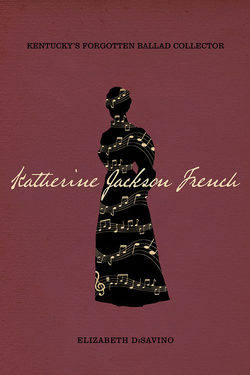Читать книгу Katherine Jackson French - Elizabeth DiSavino - Страница 14
На сайте Литреса книга снята с продажи.
Оглавление4
“A Fortnight of Balladry”
Jackson had studied medieval literary balladry while at Columbia University, so it was natural that she was intrigued by the idea of old ballads of the sung variety being kept alive in the Kentucky mountains.1
The ballads that Jackson’s classmates told her about and that she eventually sought were descendants of the same ballads that Francis Child had collected in Great Britain and immortalized in The English and Scottish Popular Ballads.2 These songs left the Old World, sailed with immigrants to New England or Virginia, and then clambered over the mountains from eastern Virginia or Pennsylvania into Appalachia. These musical fables are old; some date back to the thirteenth century and, as Ron Pen reminded me, give a sort of eternal window into issues of “race, gender, class, power relationships, identity, and memory.”3
The early collectors—and Jackson was no exception—focused on these British Isle ballad escapees. Though some of the collectors may have had a variety of motives, they held one thing in common: they thought these ballads to be worthy of their efforts, eschewing other kinds of music from other kinds of people. It was a bias that was sometimes manifested in a condescending and explanatory racism (“[The Negro’s] … mental processes are not adequate to the burden which some scholars have imposed upon him”),4 derisive dismissiveness (“When we reached the cove, we found it peopled by niggers … all our troubles and spent energy for nought”),5 or wishful racial identification (“This little booklet … will represent the life and spirit of a people in whose veins runs the purest strain of Anglo-Saxon blood to be found anywhere in America.)6
The last quote brings up a paradoxical circumstance: the ballads discovered in America were determined by the early collectors to be of both English and Scottish origin, but the ballads themselves were invariably referred to as being Anglo-Saxon. Of the immigrants who fled the Scottish Lowlands for northern Ireland and then wound up in southern Appalachia, most were actually Scots, not Englishmen. This is a case of trying to jam a square peg into a round hole. The Scots were, in fact, neither Anglo nor Saxon; their ancestry was largely Celtic. Yet the claim of the ballads’ exclusive and unblemished Anglo-Saxon origin was to continue unchallenged for close to a century.
Berea College president William Goodell Frost.
The social conditions that led to the establishment of that claim are double-edged, and no one exemplifies that better than Berea College president William Goodell Frost. Berea’s original mission was interracial and coeducational education; when the segregationist Day Law was passed in 1901, Frost took on a new focus: recruitment of mountain young people.
The stereotype of “mountain people” prevailing at the time was that they were white, ignorant, dirty, and dangerous. On the one hand, Frost sought to redeem them from that stereotype by exalting them as “of pure English and Scottish stock” and giving them a chance to better themselves through a Berea education. On the other hand, he viewed the population of the southern mountains as utilitarian “reserve forces for the coming battles of America and of Protestant Christianity” against “the foreign born and hyphenated population.” This notion of the white race being overrun by Catholics, Jews, and other non-Anglo foreigners was a prospect that many white people feared.7
Exaltation of Angloness went neatly hand in hand with that fear, and the collecting of Anglo balladry was a part of that. The fact that ballad collectors in those same mountains were finding a wealth of supposedly pure, ancient Anglo song implied, by extension, a superior and eternal value to Anglo culture. The very longevity of these songs in the face of hardship indicated, in this view, the inherent superiority of the culture from which they sprang and promised the continued dominance of that culture in the future.8
Jackson’s own interest in these ballads came from a variety of motives. First, as a scholar of English literature, Jackson was interested in and appreciated them for their own sake and expressed a kind of awed delight at experiencing them firsthand. Second, she was out to make a name for herself in academe, and this seemed a handy way to do so. Third, she was a woman acquainted with and proud of her Scottish heritage (though, like Bradley Kincaid, she equated that to being Anglo-Saxon) and therefore felt a personal connection to the ballads. Finally, she was a believer in the power of English literature and English culture. As with other early collectors, this resulted in a bias of omission against other musics of the mountains.
